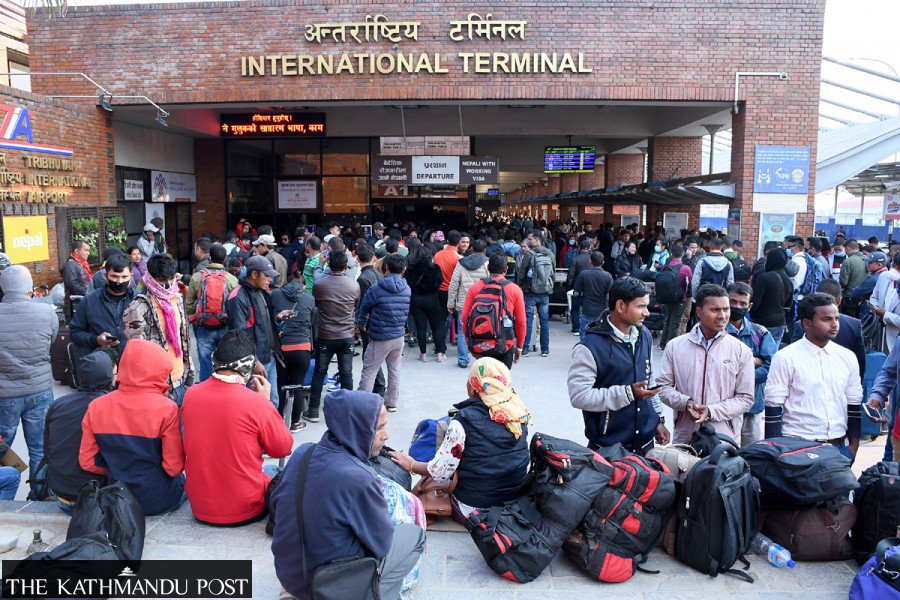Money
Remittance drops for the third straight month
The fall has sparked concern that any significant decline could disturb the structure of the economy at the macro level.
Sangam Prasain
The inflow of workers’ remittance dropped for the third straight month of the fiscal year 2021-22 despite an increase in the number of outbound migrant workers with major employment destinations reopening their doors to foreign job seekers.
The fall in money transfers during the largest festival season, the key consumption months lasting from mid-September to mid-October, has caused alarm as any significant decline could disturb the structure of the economy at the macro level.
According to the latest central bank data, the amount of money sent home by Nepalis abroad shrank by 7.6 percent to Rs239.32 billion in the first quarter (mid-August to mid-October) compared to a 12.7 percent increase in the same period of the previous fiscal year.
The number of Nepali workers taking approval for foreign employment, however, increased sharply to 66,316 in the review period. The number of approvals granted in the same period of the previous year had plunged by 96.8 percent year-on-year.
The number of renewed entries of migrant workers taking approval for foreign employment increased significantly to 34,823 in the review period. It had decreased by 78.6 percent in the same period of the previous year.
The current fiscal year started off on a sour note after witnessing record high remittance earnings in the last fiscal year.
In the first month of the fiscal year 2021-22, remittance inflows fell by a steep 18.1 percent to Rs75.96 billion in contrast to an increase of 23.0 percent in the same period of the previous fiscal year, according to Nepal Rastra Bank.
Earnings dropped by 6.3 percent to Rs155.37 billion in the first second month as against an increase of 8.1 percent in the same period of the previous fiscal year.
Nepali migrant workers sent home Rs961.05 billion in the last fiscal year 2020-21 ended mid-July, a record-high money transfer to Nepal since Nepalis started going off to work overseas more than two decades ago.
The amount grew by 10 percent year-on-year, which is equivalent to 22.5 percent of Nepal’s current gross domestic product of Rs4.26 trillion evaluated at current market prices.
Remittances, the flow of capital from immigrants to families back home, are a crucial source of income for many countries, including Nepal.
Several migration experts mentioned that hundi, an illegal way of transferring funds that helps money laundering, came to a complete halt following the Covid outbreak due to movement restrictions in the migrant destinations.
As a result, Nepal saw all-time-high remittance inflows in 2020.
“These hundi activities have begun to stir again,” said Nara Bahadur Thapa, a former executive director at Nepal Rastra Bank. “A portion of foreign currency retained by hundi traders is being used to clear import payments as well.”
He added that since there has been a massive rise in the number of students going abroad, and since the central bank issues only $1,500 to each student due to depleting foreign currency reserves, hundi traders are stepping in to take advantage of the opportunity.
Previously, the foreign exchange allowance was fixed at $2,500. Students have been turning to hundi, or informal money transfer, to make up for the shortfall.
“The amount of $1,500 is not enough for students. They do manage from hundi traders,” said Thapa. “At this moment, the government can do nothing.”
Authorities have started taking certain measures to control the outflow of foreign exchange in recent weeks.
The Department of Immigration has halved the minimum amount of foreign exchange Nepali travellers need to carry to $500. The minimum amount that travellers—both workers and tourists—going to Bahrain, Kuwait, Oman, Qatar, Saudi Arabia, the United Arab Emirates, Malaysia, Thailand and South Asian nations need to carry has been reduced further to $250.
Earlier, Nepalis travelling abroad were required to show to airport immigration officials that they had at least $1,000 on them. The amount has been slashed as per the request of Nepal Rastra Bank.
Although the central bank allows Nepali citizens travelling abroad to buy a maximum of $1,500 from banks, most Nepalis usually exchange less than that.
There has also been a massive growth in imports, which shows that business activities have happily returned to normal levels. But on the flip side, this has been exerting pressure on the country's foreign exchange reserves. “Imports for consumption are mostly financed by remittance,” said Thapa.
During the first quarter of 2021-22, imports soared by 63.7 percent to Rs478.52 billion against a decrease of 12.7 percent a year ago. Destination-wise, imports from India, China and other countries increased by 48.4 percent, 55.2 percent and 124.2 percent respectively.
Gross foreign exchange reserves shrank by 5.7 percent to Rs1,319.32 billion as of mid-October 2021 from Rs1,399.02 billion as of mid-July 2021, according to the central bank. Of the total foreign exchange reserves, reserves held by Nepal Rastra Bank decreased by 8 percent to Rs1,145.29 billion as of mid-October 2021 from Rs1,244.63 billion as of mid-July 2021.
The total trade deficit shot up by 58.3 percent to Rs413.47 billion during the first three months of fiscal 2021-22. During the corresponding period of the previous year, the deficit had contracted by 15.1 percent.
The money sent home by Nepalis working abroad has played a crucial role in lifting people from poverty.
Remittance income has also pushed up consumption. According to the Central Bureau of Statistics, in the last fiscal year that ended mid-July, Nepal’s final consumption expenditure at current prices amounted to Rs3.98 trillion, representing 93.38 percent of the gross domestic product.
The drop in vital remittance income in the first quarter has raised concern, but Thapa said that, based on the increased number of migrant workers going abroad, remittance inflows would start swelling within a few months. “The current trend is a transitional one,” he said.




 10.03°C Kathmandu
10.03°C Kathmandu














